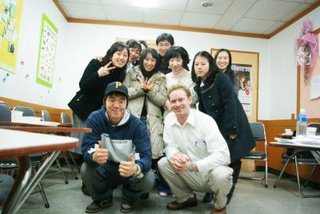Friday, February 16, 2007
Memories of English that was...Not Good.

I was nearing the end of the conversation test on the topic of computers in my evening class. One of the two students sitting before me, a college student in his early 20s, was doing okay, while Hansen, his frequent conversation partner and friend since high school, was clearly struggling.
“JK,” I said, “please ask Hansen question number thirteen from lesson twelve.”
Looking at the back of his textbook, JK pondered the scrambled words with the missing articles and prepositions corresponding with the number 13 and then, with little difficulty, deciphered the intended inquiry: “Have you ever studied computer languages such as Java or C++?”
Hansen appeared blank momentarily, before finally replying, “No, I didn’t.” I made a mental note: Too short of an answer; wrong verb tense and made plans to subtract points from his grade.
I then gestured to Hansen to inform him that it was his turn to ask JK a third and final question. “Number nineteen,” I said.
He stared blankly at the paper, and I knew I’d have to walk him through it. He’d get no points for asking the question correctly, but I felt it important that his partner answer a difficult question before he left my desk and returned to join the rest of the class, who were seated in conversation practice.
“What would you think …” I began, and Hansen repeated after me, “ … about a job … where you had to … work with computers … all day long?”
Hansen finished the question and we waited for a reply. I watched as JK, who had been cool and collected throughout the test, suddenly grew wide-eyed and began to stare out the window next to my desk.
“I think it’s not good …” he paused as if to add emphasis, before clinching his declaration with: “… my body.”
I stopped to contemplate this sentence for a moment: “I think it’s not good … my body.” I knew that Korean students struggle heavily with prepositions, and they generally substitute the word “body” to mean “physical well-being,” so maybe he was saying, “I think it wouldn’t be good for my health.”
Or was he saying, “My body is not good?” I suppose I should have pointed out his mistake and made him elaborate, but I was unable, because of the snicker which had seized me in its grasp like an epileptic fit.
“Okay, you can go,” I said as I covered my face with my hand, trembling as I sought to contain the natural expression of my amusement. Apparently, they had not heard me clearly, because they were still sitting in the same place, rapt by my rapidly reddening face.
“You can go now,” I reiterated, but still they did not move. “Please go!” I said, this time pointing at the other students, who were beginning to turn their heads my way. They finally left, and I buried my face in the books on my desk, hoping to regain my composure before the next students took the test.
One of the greatest obstacles English teachers in Korea must overcome in their students is what is known as “Konglish.” Konglish occurs when students Koreanize their English. In pronunciation, l is often confused with r (“I usually eat lice with various side-dishes for breakfast”) and almost never used in combination with another consonant (“Poke is illegal in Saudi Arabia”).
Konglish also occurs when they use a word in the wrong context (“Did you make a girlfriend in Seoul?” or “All Koreans have black eyes”) and misapply adjectives (“I didn’t like that book because it made me very boring” or “Very little people in Korea use toasters”).
Others result from students’ limited knowledge of vocabulary. For example, a large number of women in Korea are deathly terrified of pigeons. I had wondered if it was because they are seen as carriers of disease, if they are considered pests, or if women in Asia had been subjected to an immodest amount of Hitchcock flicks.
So, I sought enlightenment from one of my female students on the subject. Her answer was, “Birds feet are very … not good.”
It’s a bit harder to pinpoint the reasons for other instances of Konglish. For example, in January, when I asked some students to write down their New Year’s resolution, one of them wrote: “I wanted to waste my body because I was more and more fatting.” Recycling is very popular in Korea; it’s actually mandatory in cases of paper and plastic, but that’s one thing I’m pretty sure you can’t get back.
I won’t always be an English teacher, and there are some things about the job I won’t miss. I don’t like it when failing students beg me to pass them even though they’ve been absent from my class 10 times. I don’t like telling students who have obviously studied hard that they can’t graduate simply because they’re speaking ability isn’t good enough yet. I am particularly not fond of finishing classes at 9 p.m. every night and then have to start teaching again at 7 a.m. the next morning.
However, in what other job can you inform the people you work with that you are suffering from the effects of a cold, and have one of them send you a text message later that reads, “I hope to recover your feel & body!”
My job is to correct sentences like that, but I often wish I didn’t have to.
Subscribe to Comments [Atom]
